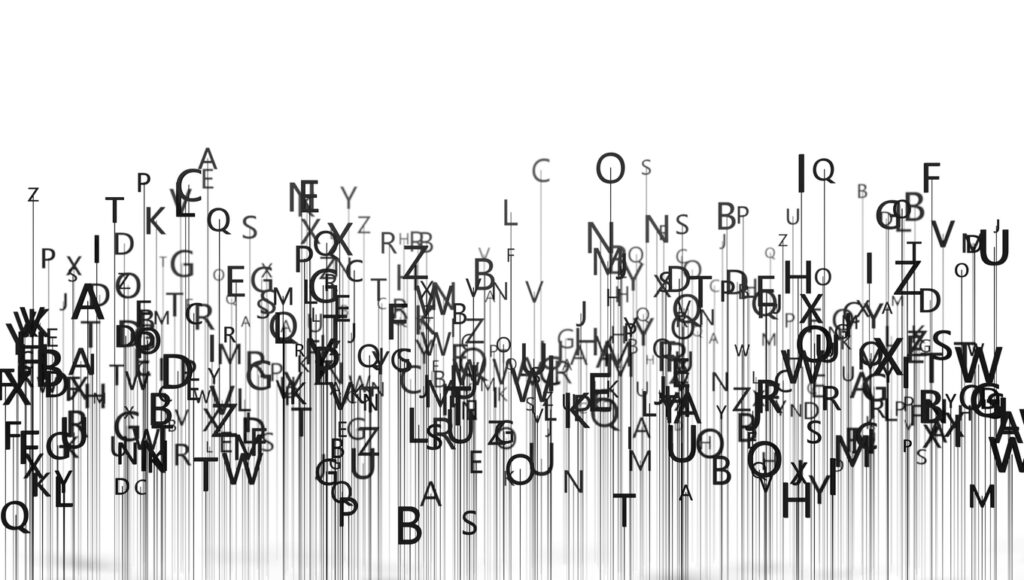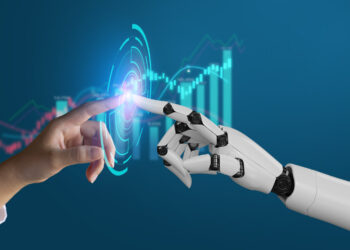Over the last months, the volume of words – on the page, screen, podcasts, and broadcasts – devoted to AI, particularly ChatGPT, has been intense. And the apocalyptic tenor of much of it is equally if not more intense. What is the nature and what are the implications of Large Language Models (LLMs), what will they mean for everything from human companionship and connection, to education and employment, to the very nature of humanity itself? It’s easy to get, if not apocalyptic then at least existential.
Here on the Kitchen, conversations have trended toward, understandably, the implications for the authority of research and the practice of its publication and dissemination. Even in yesterday’s guest post, the questions ChatGPT raises about disinformation, research integrity, and workflows are substantial.
But I wanted to talk to someone who has been thinking deeply about text and technology – and their recent history. Readers and writers and their critics have been freaking out about technology and genre for centuries, worrying for example that the novel (18th century) would doom the already weak feminine mind, or that the production of cheap print (19th century) would doom the economy by distracting workers. So is ChatGPT and the rise of LLMs another baseless freakout, or is it something new and different?
Matthew Kirschenbaum is a professor of English at the University of Maryland, and he writes about how writers in particular have been challenged by recent technology. His terrific book, Track Changes: A Literary History of Word Processing, is worth a close read for the insights about culture and specific technologies, but also for the accounts of how some literary greats encountered, freaked out about, or embraced the machinery that is now so essential to writing. Kirschenbaum reminds us, for example, that “if the keyboard displaced hand from page, it also altered the relationship between an author and the basic building blocks of language.” (p. 160). Some authors pointedly described their work as not composed on computers because they figured that was surely a sketchy way to work.
Last month Kirschenbaum wrote about LLMs for The Atlantic in “Textpocalypse,” a piece with the forbidding subtitle “our relationship to writing is about the change forever; it may not end well.” Given the careful (and lively) context around writing and technology in Kirschenbaum’s work, he’s just the person I wanted to talk to – and the person I was sure would bring a fresh (humanities!) perspective to this conversation. (You can read a small number of Atlantic articles for free each month if you’re not a subscriber.)

In the penultimate paragraph of your Atlantic piece you describe the process of writing it (15+ hours as captured on the doc). Why is that labor of writing important for us to contend with as we think about LLMs?
MK: Writing is a very human act. It’s a very intimate act. But writing is also hard work. One of the ironies of the software that we use is that we can actually capture and track with great precision exactly how long we’ve spent, how many keystrokes. The numbers quoted in that paragraph are a lowball estimate. That was just the time on my end. I had a very good editor, and I’m very happy with how the piece turned out. I think it reads very smoothly, but there’s not a sentence in there that wasn’t gone over again and again and again by myself, by the editor, by copy editors, and fact checkers. I think when we just read stuff on the web, scroll past it as we’re eating our lunch or whatever, we miss all of that invisible labor that goes into producing an article for an outlet like The Atlantic.
Writing as a form of labor is part of what makes it very human and very important but it’s also that which makes it vulnerable to exploitation and automation by industries and economies that value efficiency and throughput and productivity, more perhaps than they do the actual craft of writing. That’s where the LLMs, the large language models come in. And again, why I think writing is also particularly vulnerable to the kind of automation that they afford.
You’re a professor in an English department and you’ve written extensively about the relationship between writing, reading, and technology. How do you think about LLM-fueled text in the context of other transitions – or transformations – in technologies of reading and writing, like the revolutions of movable type or the penny press?
MK: On the one hand I tend to resist generalization, “oh, this is just like Gutenberg”. But this moment really does feel very intense. And the speed with which what I’ll loosely call the AI industry is moving is really kind of astonishing. It’s not just about where we are right now, it’s where we’re going to be in six months and 18 months and five years and so forth.
One of the more particular ways that I wanted to come at this is by thinking about what text is. In the course of my career, text has become a verb – we now text people. That’s a new coinage, but it also speaks to that changing relationship that we have towards text as something that somehow is dynamic, a form of action as much as it is a kind of static object. And following from that, thinking about text as specifically a form of data. Not so much text, if you will, as dot txt text. Text is a data type, and that makes it fungible, exchangeable, and subject to algorithmic transformation and manipulation. All of the things that the large language models are actually doing at a kind of mathematical level is possible because the category of human expression that we call text has also been operationalized as a functional data type that computers can input and then output.
Text is a data type, and that makes it fungible, exchangeable, and subject to algorithmic transformation and manipulation.
And that obtains, I think, not just at the level of things like algorithms and large language models, but also very much in terms of what we might think of as the political economy of the web where text is a form of content. It’s relatively recent to think about content as this category of exchangeable media, whether text or an image that goes viral or a video or anything else. William Safire was among the first people to take note of the way in the late 1990s everyone in the .com industry was suddenly talking about something called content as a surrogate for what writers and artists and creatives of all sorts were doing. So text is a data type, it’s also a form of content. And that for me, lends it a kind of commodity value, and this too is where the language models come in. Because of the way in which they operate, they’re going to accelerate and amplify the commodity value of text as content, and they’ll be able to do so because text is this operationalized data type subject to automatic manipulation
One of your key points is that reader discernment will be dramatically transformed/ reduced by what you call the “gray-goo” of endless text generation. Is there a meaningful difference in kind, as well as scale, or is one (kind/scale) more concerning than the other – or is it the combination of kind and scale that makes the goo so ominous?
MK: I think both. Absolutely scale; I think the magnitude of output that these models are already capable of and will be capable of is the textpocalypse scenario, a kind of tsunami of text and content. The gray goo is also going to be personalized and individualized in the sense that we read the machine text, but the machines also read us. We see this all the time on the web already, of course, personalized advertisements and that sort of thing. You are going to start to see scenarios where the content of particular websites is literally being rewritten in response to profiles of individual users. All of the routine surveillance that happens on the web, all of that data that’s being collected about you at an individual level now will be feeding back into a kind of bespoke language model that is tailored to the preferences of Karin or Matthew or anyone else. So that that seems to me to be something new under the sun.
For readers of The Scholarly Kitchen, discernment is of course connected to the authority of the text and evidence-based research findings. Could you speak to how textual authority has been changing over (potentially eons of) time? How will we know if we’re reading human or machine made text?
MK: I’ll give you a willfully provocative answer: in 10 years we won’t know and we won’t care very much either. The hard version of the text apocalypse scenario is this lurid notion of the web overtaken by robots publishing those tsunamis of text. The softer version is a kind of silent, deep penetration into our day-to-day writing habits. And we’re already seeing this with AI tools being directly integrated and embedded into word processors and other forms of productivity software.
This is also where the history of word processing comes back into play. Just as we’ve progressed from basic spell check to grammar check to tools like predictive text, so too will the generative AI, which in some ways it’s really just predictive text on steroids, take hold in exactly the same way.
At some level, it’s not going to be meaningful to make the distinction between a “human-authored” or “machine-authored” document. The vast majority of what we write is going to be kind of hybrid where, under the best of circumstances, you have a real thinking person at the keyboard who is using the generative AI as another form of word processing, working with its outputs, shaping them, adjusting them, revising them, and so forth, and making them a part of the texture of the individual’s own prose.
At some level, it’s not going to be meaningful to make the distinction between a “human-authored” or “machine-authored” document.
Will a textpocalpyse mean we return to the authority of the handwritten and hand delivered missive? Is there a slow food movement for text?
MK: In one of my other lives, I’m a letter-press printer and I teach a course called Book Lab. Students love it. I don’t know that they would put it in exactly those terms, but I think part of what they’re responding to is very much what we might think of as a kind of artisanal production and sort of slow reading, slow making where they’re doing something physical with their hands, they’re literally getting their hands dirty in something. It’s tactile, it’s collaborative, it’s social. And I think there’s going to be a place for that. I resist imagining that, in particular as sort of the future of literature capital L as it feels a little twee, and in some ways we already have this in the form of independent publishing on small presses and even letter press specifically, which is still very much a kind of living tradition. But I do think you’ll see that, and I think you’ll see some writers or even publishers sort of branding work as 100% human, you know, like the equivalent of organic food, right? So yes, farm to table literature.
So yes, farm to table literature.
Do you think a humanities perspective can help steer us through or at least give us a critical purchase on these kinds of issues – and especially this one?
MK: I do. And I have to think that because the other alternative is just absolute resistance. And I think there’s a lot of space for critique of these new technologies. I think all of that is necessary and part of the work of the humanities. Having said that, I also think it’s perhaps an existential mistake if our only posture is resistance. I look at what these tools are doing, um, certainly with, um, with, with text, but also images and other forms of media, and it’s this enormous outpouring of creativity and expressivity and imagination. If you go to Mid Journey and you sit on the Discord server, you literally can’t keep up. Everything is scrolling by so quickly as the feed is constantly being refreshed – it’s this kind of kaleidoscope of imagery originating in large computational models. Nobody quite knows where they come from, except we do know that there are artists who are not being compensated for having their work scraped up and assimilated into the models. All those issues are real, but it’s so hard, not, at least for me, not to feel a little bit of excitement around this moment, and to want to kind of find ways to tap into that at a creative level and participate in it in a responsible, rather than an exploitative way.
I think with text, it’s actually going to be a little bit more difficult perhaps than the image. The image generators are these sort of gumball machines or juke boxes. You just keep pressing the button and you don’t know what’s gonna come up next. Text is a time-based medium. It takes time to write it, it takes time to read it. I think the practice of something like AI poetry or AI storytelling is going to take a little bit longer to sort of finesse and to craft and to hone. It won’t have necessarily the the popular appeal that, say an image generator does. In my department here at Maryland, we’re launching a minor in digital storytelling and poetics. And the whole premise of it is that the best thing we can teach our students is not to hide or shelter themselves from these technologies, but to find ways of engaging with them in creative and responsible ways. For me that’s the way forward that is as important as operating in the mode of critique and resistance.
Discussion
1 Thought on "Textpocalypse: A Literary Scholar Eyes the “Grey Goo” of AI"
Recommended reading and relevant in the context of the interview above, especially the statement “And the whole premise of it is that the best thing we can teach our students is not to hide or shelter themselves from these technologies”: ChatGPT is causing an educational crisis (opinion) https://www.insidehighered.com/opinion/views/2023/04/18/yes-we-are-chatgpt-crisis



